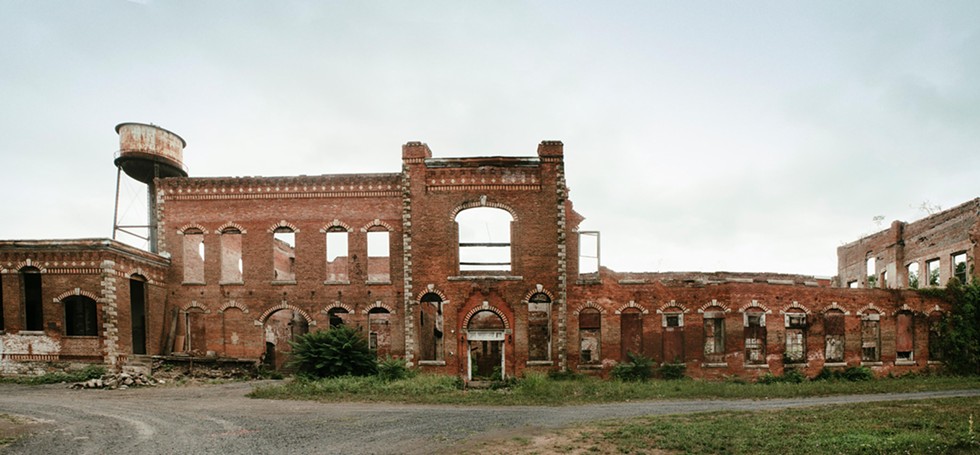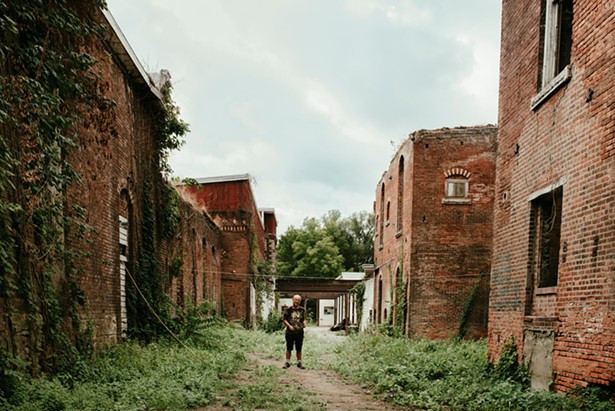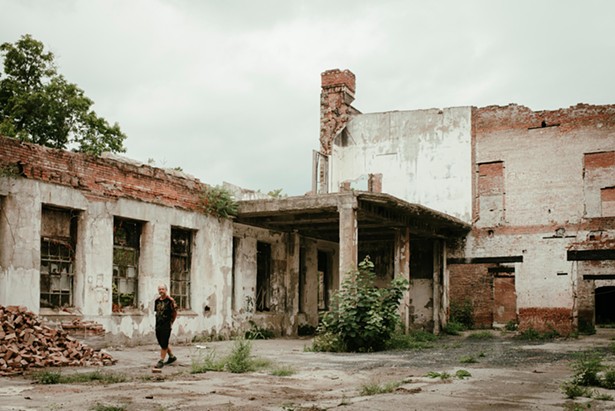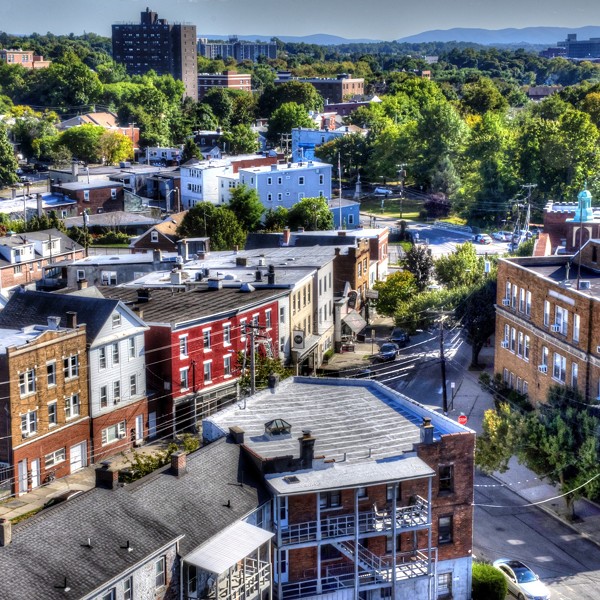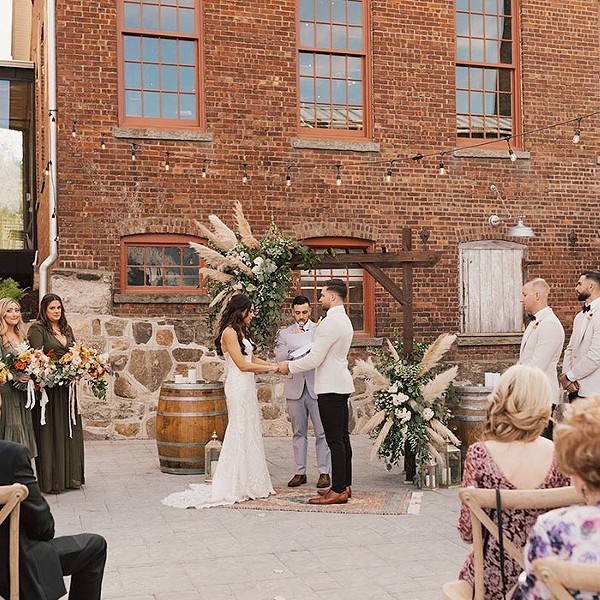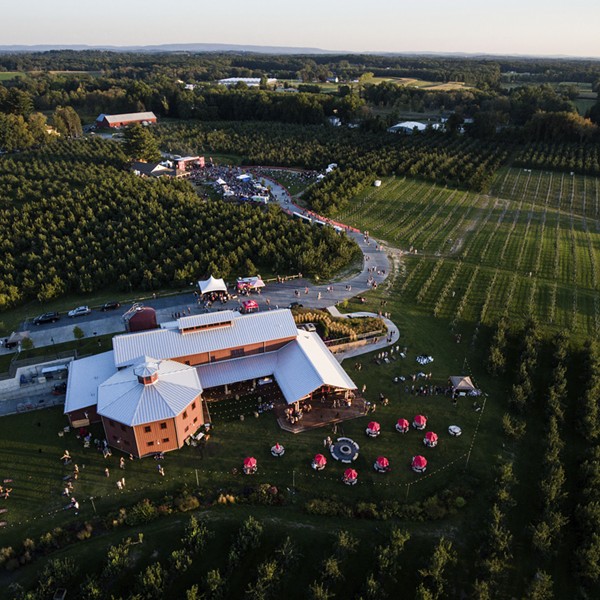Rehabilitating a historic brick building is a challenge in itself; transforming 12 of them at once into a world-class dining and lodging experience isn’t, well, for the faint of heart. But that’s exactly what Michael Dorf, who helms the City Winery franchise—and prior to that, NYC’s Knitting Factory—has taken on with his latest enterprise, The Milk Factory, in Walden.
The project’s name is a nod to the Borden Dairy Company, who first brought its empire to the Hudson Valley in 1884 by constructing the company’s largest condensed milk factory along the Wallkill River. It was an elaborate complex that utilized milk from thousands of local cows and ran until the early 20th century. Although the facility hosted a few ill-fated companies in ensuing years, it lay dormant, deteriorating for decades, until Dorf purchased the property last year.
He envisioned transforming the crumbling complex into an experiential boutique hotel with a winery, distillery, restaurant, and private events facility. The massive undertaking meant revitalizing 85,000 square feet of structures across 22 acres.
“The space is historically significant to the entire Hudson Valley—the factory provided condensed milk to the world,” Dorf says. “We want to embrace that history, while trying to bring a little bit of New York City-quality hospitality, all in a way that allows the Milk Factory to feel ingrained into the fabric of the Hudson Valley.”
As a resident and weekender in the Hudson Valley for about 35 years, Dorf is a fan of exploring the region’s rail trails, and that’s how he stumbled upon the factory’s abandoned-yet-alluring ruins. “I was riding my bike from my house to City Winery Hudson Valley and would see the old milk factory, which has a portion that connected right to the rail trail—the original rail cars would come right into the factory,” he explains. He envisioned an experiential complex that offered a place for rail trail users to visit, while conversely encouraging hotel guests to explore the trail. “It would connect this historic feature of the community with the trails once again,” he adds.
The project has made strides, however Dorf says the team is looking at another 18 to 24 months before opening. “It was bought for almost one-100th of what it will cost to complete [an estimated $35 million], but it's a long-term investment, and something that will hopefully have legacy,” he says.Given City Winery Hudson Valley’s contributions to tourism and local employment, government and economic development planners were excited about the new, larger project’s potential. Last year, Governor Hochul announced that the Milk Factory would receive a $1.5 million NYS Economic Development Grant for the adaptive reuse of a neglected property.
“It’s been very embraced by the county, but the devil’s in the details, especially with historic buildings,” he says. Besides zoning concerns, the buildings had no electricity, water, sewer, or heating, plus fire damage. “It’s a lengthy process, and as much a passion project as it is an economic project.”
Once open, the hotel will feature 58 spacious rooms, a health club, a large spa, outdoor pool, and other amenities. Dorf says they’ll be working with a hotel partner; Milk Factory will be its own brand, but integrated into a network. He uses Wildflower Farms by Auberge Resorts in Gardiner as an example—but is quick to note that the costs will be more of an affordable luxury, aiming for $500-$600 per night on weekends.
Although the onsite restaurant is separate from City Winery, guests can expect the same quality of food and wine. “We’ll have an onsite winery, too, that can serve as an auxiliary winery to what we're doing in Montgomery,” he says. Also of note, a distillery will feature whiskeys made in collaboration with well-known musicians, like Joan Osborne. “She enjoys whiskey and will be fully involved with designing a whiskey with a profile that’s uniquely her preference, from selecting grains to final tasting,” he explains.
Beyond that, however, the Milk Factory isn’t planning to become involved with the music scene. “City Winery is 10 minutes away so we don't feel the need to have club shows here,” he says. “We’re focusing more on private events, plus with our connection to trails, our planned bike valet, and proximity to the Wallkill River, we’ll be more geared toward nature and outdoor enthusiasts.”
The project’s main architect is Todd Zwigard of Beacon, who also worked on City Winery Hudson Valley, but Dorf’s vision plays a large part in the design. “I’m a closeted architect; I originally applied to college for an architecture program,” he explains, “but for the interview, I showed up with a portfolio of five basement rec rooms that I designed as a 15-year-old kid in the Midwest—sketches of panel walls, drop ceilings, classic ugly features. The interviewer asked, ‘You convinced these people to let you do this? I recommend you register for the business school.’ So, I got an education in business, but it gave me the understanding how to incorporate the customer journey—the deliberate, intentional thinking about the customer and their experience,” he says.
This philosophy inspired the idea of transforming the old rail line that cuts through the buildings into a cobblestone walkway. “The rail line ran about 1,000 feet between buildings, and we made it feel like an old European street that guests can walk and use to access the pool, distillery, a curated gallery, co-working space, and other areas. We call it the Milky Way,” he says.
Dorf notes that the factory has been such a part of the local landscape that he’s not looking to create a new scene around it but, rather, an enhancement for what people already enjoy. “I love living in this area and the beauty of it, so we want this to feel like something that fits organically, not exploits the land: A beautiful facility that's used by the community, and a proud Orange County destination.”







